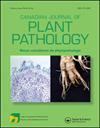日本双孢菌在中国引起的日本Kerria叶斑病
IF 1.5
4区 农林科学
Q3 PLANT SCIENCES
引用次数: 0
摘要
摘要本文报道了我国及世界上首次发现由双孢子虫引起的日本Kerria叶斑病。2020年9月,从中国江苏南京采集了具有叶斑症状的粳稻叶片。叶片病变形状和大小不规则,主要形成在叶片中间,病变多呈白色和淡褐色。根据内部转录间隔区(ITS)、延伸因子1-α(EF1-α)、β-微管蛋白(β-tub)、组蛋白H3(HIS)和钙调素(CAL)基因的形态学特征和多基因系统发育分析,从病叶中分离出一株真菌,并鉴定为双孢双孢菌。三株分离的真菌在接种后的粳稻叶片上引起叶斑症状,与田间观察到的自然症状相似。这种疾病大大降低了受影响植物的观赏价值,病原体的鉴定对疾病的预防和控制具有重要意义。本文章由计算机程序翻译,如有差异,请以英文原文为准。
Leaf spot of Kerria japonica caused by Diaporthe pescicola in China
Abstract This article reports the first known occurrence of leaf spot of Kerria japonica caused by Diaporthe pescicola in China and worldwide. Leaves of K. japonica with leaf spot symptoms were collected in September 2020 from Nanjing, Jiangsu, China. Leaf lesions were of irregular shape and sizes forming mostly in the middle of the leaves, and most of the lesions were white and hazel in colour. A fungus was isolated from diseased leaves and identified as Diaporthe pescicola based on morphological features and multigene phylogenetic analysis of the internal transcribed spacer (ITS) region, elongation factor 1-alpha (EF1-α), beta-tubulin (β-tub), histone H3 (HIS) and calmodulin (CAL) genes. Three strains of isolated fungus caused leaf spot symptoms on inoculated wounded leaves of K. japonica, which were similar to the natural symptoms observed in the field. This disease greatly reduces the ornamental value of affected plants, and identification of the pathogen is significant for the prevention and control of the disease.
求助全文
通过发布文献求助,成功后即可免费获取论文全文。
去求助
来源期刊
CiteScore
4.50
自引率
5.00%
发文量
56
审稿时长
6-12 weeks
期刊介绍:
Canadian Journal of Plant Pathology is an international journal which publishes the results of scientific research and other information relevant to the discipline of plant pathology as review papers, research articles, notes and disease reports. Papers may be submitted in English or French and are subject to peer review. Research articles and notes include original research that contributes to the science of plant pathology or to the practice of plant pathology, including the diagnosis, estimation, prevention, and control of plant diseases. Notes are generally shorter in length and include more concise research results. Disease reports are brief, previously unpublished accounts of diseases occurring on a new host or geographic region. Review papers include mini-reviews, descriptions of emerging technologies, and full reviews on a topic of interest to readers, including symposium papers. These papers will be highlighted in each issue of the journal and require prior discussion with the Editor-in-Chief prior to submission.

 求助内容:
求助内容: 应助结果提醒方式:
应助结果提醒方式:


